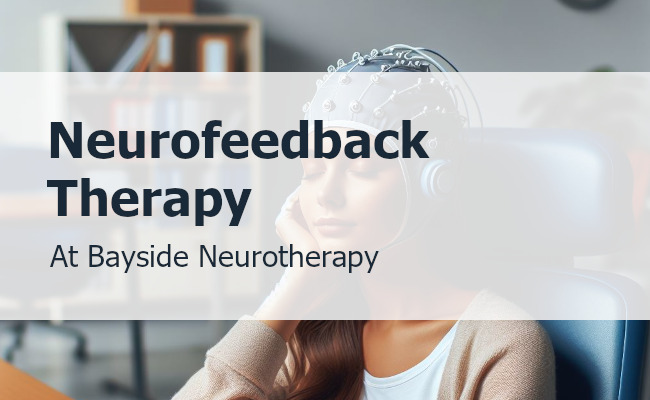
Neurofeedback therapy (or neurotherapy) is a proven, non-invasive, state-of-the-art method that uses an EEG (electroencephalogram) device for teaching the brain to function in a more balanced and healthful way. The entire process is completely painless and does not require the use of any drugs or medications.
Sometimes the brain's electrical activity can become imbalanced, too active or dysregulated. When that happens a wide array of disorders can develop, like ADHD, learning disabilities, anxiety, depression and many others. At Bayside Neurotherapy we can measure and map your brain's electrical activity with an EEG and determine what needs to be adjusted for optimum mental health. Then, we use Neurofeedback techniques to correct the imbalances.
First, it's important to know that your brain is continuously producing brainwaves. Brainwaves are electrical impulses that help regulate your mood, attention span, focus, sleep, happiness and many other important neurological functions. We use a qEEG machine with small electrodes placed on your scalp to monitor and record your brainwaves. Don't worry, the electrodes sit on the surface of your scalp and are completely painless.
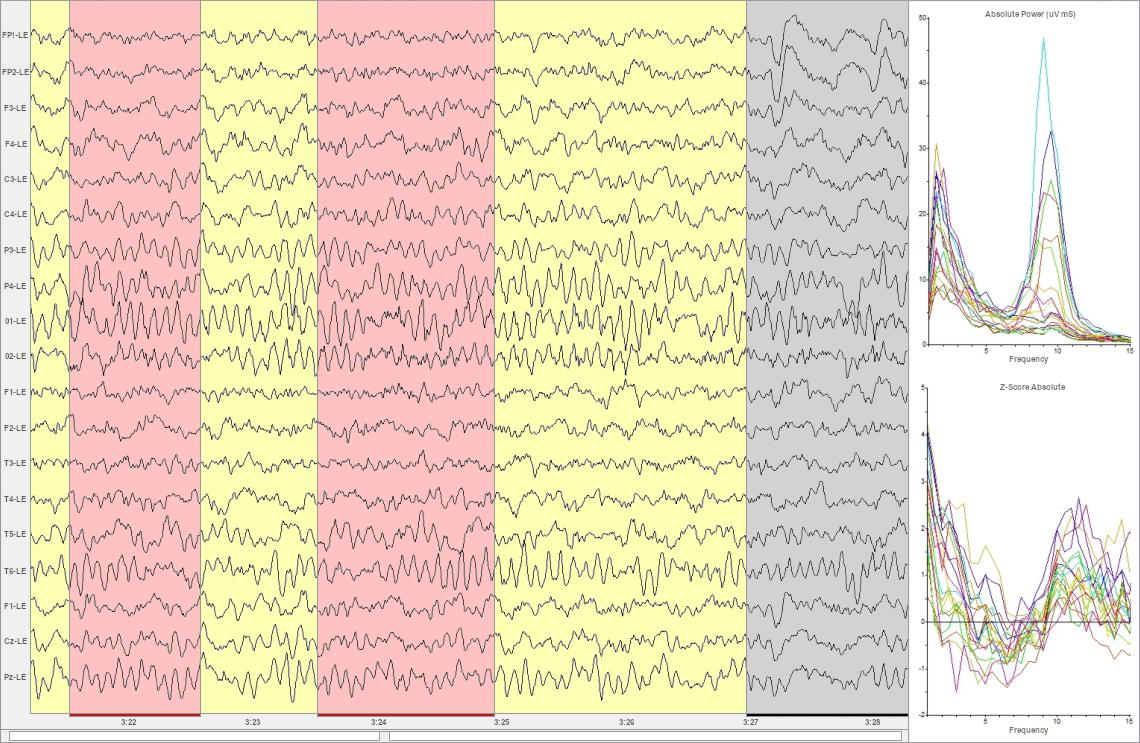
A sample of EEG measurements showing brainwaves at various frequencies.
When you're calm, focused and relaxed your brain will produce certain types of brainwaves in specific areas of your brain. However, when you experience anxiety, depression or other negative states, your brainwaves will change. Some medications, head injuries and other trauma can also change your brainwaves.
Neurofeedback training works by monitoring your brainwaves with a qEEG machine and processing the data through proprietary software. If your brainwaves need to be adjusted, then various types of training can be used to adjust your brainwaves. For example, your brainwaves can be monitored as you watch a movie. If your brainwaves begin to become anxious or unfocused, software will overlay bubbles or clouds on the TV screen. When your brain returns to a calm, focused state, the bubbles or clouds will disappear. After a short while, your brain will learn to return to a calm, focused and relaxed state when the bubbles or clouds appear on the screen. Soon, your brain will learn to maintain a calm, focused and relaxed state all the time.

A Neurofeedback video game.
Several types of training are available. You can watch movies, TV shows, listen to music and even play video games. Most people find the training sessions to be relaxing.
The process of Neurofeedback training begins with an intake session where we will complete what we call a "brain map" of 19 brain locations (also called a qEEG). First, sensors from our a state-of-the-art 19 point EEG equipment are positioned on the scalp and ears (the sensors are non-invasive and painless). During the brain mapping process your brain's electrical activity is measured while you perform some simple mental tasks. We monitor and record your brain wave activity and feed the information into a computer. The computer software will analyze the amplitude and location of your brainwaves and create a 3 dimensional brain map.

An example of a Z Scored FFT summary report.
We also analyze and compare your brain wave patterns to a normative database of brainwaves. Our software will generate an analysis that will assist us with identifying any brain wave irregularities that are present and the degree of severity.
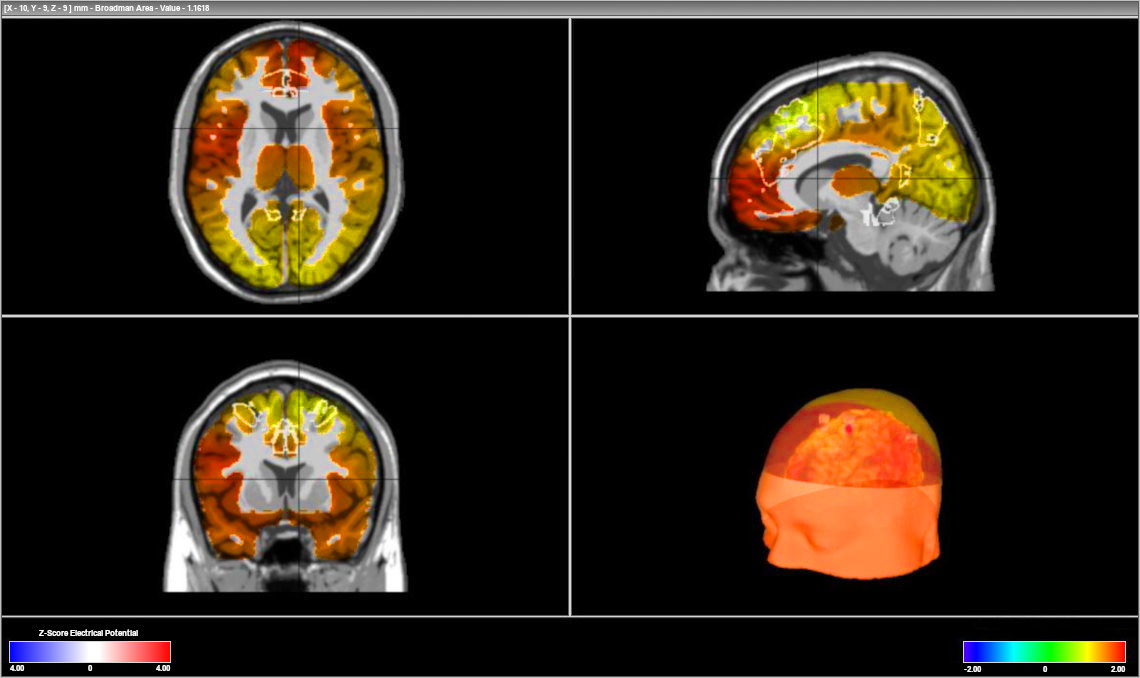
A 3 dimensional brain map image of brain activity levels at different frequencies.
Based on your brain map, normative database evaluation report and our years of experience, we can develop a Neurotherapy treatment plan specifically designed for you.
We can train a wide array of symptoms including:
Some people who do not experience severe brain wave irregularities use Neurofeedback training to optimize their brain's performance (called peak performance training). Using Neurofeedback therapy to preform peak performance training can help you achieve your highest possible levels of:
Please contact us if you have any questions about disorders that are not listed.
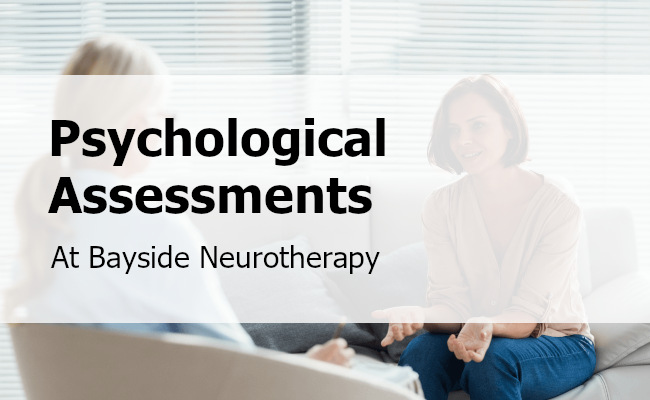
Psychological assessment can be an integral part of understanding the full picture of your cognitive and psychological functioning, as well as identifying your individual strengths and limitations. This information can be used to help you and your providers to determine the most beneficial psychological and educational interventions.
At Bayside Neurotherapy, we tailor our assessments to meet the individual needs of each client, and to elicit the most information to appropriately answer the assessment question. We offer comprehensive psychological evaluations for areas of concerns, including:
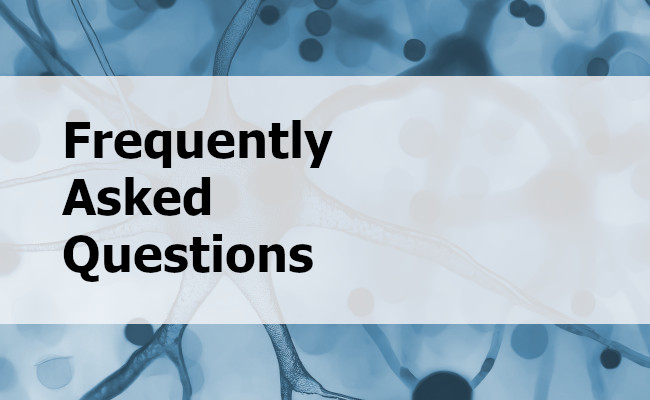
The number of sessions depend on the particular symptoms you're suffering from and the data from your initial assessment. The average person can benefit from 25-40 sessions. Some clients benefit from fewer sessions and some clients benefit from more.
A thorough initial assessment will give us a better clinical picture of what symptoms are present. Based on the assessment we'll develop an initial treatment plan. Because all brains are different, it's difficult to predict with accuracy how many sessions will be needed. Often people notice benefits within a few sessions, but the goal is not just a reduction in symptoms; it's also long-term stability.
Training typically begins with twice a week sessions when possible. Three to four times a week can be helpful for clients in crisis, or with severe dysregulation, or for clients who choose to train faster. Typically, sessions decrease to once a week, then every other week as symptoms improve.
The good news is, you'll typically know within the first round of neurofeedback sessions if training makes sense for you, unlike medications where you often wait for several weeks to see if it's effective. Neurofeedback may also be used in combination with psychotherapy. While the two modalities can work well together, they do not replace each other. As neurofeedback training improves brain function, other emotional and behavioral issues can be easier to resolve with psychotherapy.
A success rate of 75%-80% is commonly quoted by clinicians for neurofeedback training. In the majority of clients, symptoms improve with neurofeedback. However, we cannot really know to what degree symptoms will improve for any individual - everyone's brain is unique. The vast majority of people who commit to neurofeedback training experience some relief in their symptoms.
Studies conducted by Dr. Joel Lubar, a pioneer in the field from the University of Tennessee, has reported his clients maintained the benefits of brain training 20 years later.
Although this was Dr. Lubar's longest follow-up study, there is no indication that his clients would not continue to benefit from their previous 20 year training or that symptoms would reappear. There are other studies that conducted follow-up 6 and 13 years later and the participants maintained their benefits from the neurofeedback training. Over time, the rewarded activity becomes the new, normal, adopted brain pattern. Once established, these new patterns have a lasting effect allowing the brain to work better, more efficiently, and more easily. Generally, once the brain has adopted a new pattern, the results last. It is prudent for us to note that many foreseeable and unforeseeable factors are involved in determining how well training holds, such as major life stressors, head trauma, and self-medication.
Yes. Clinicians report that over 50% of their neurofeedback clients begin training while on one or more medications. At a certain point in training, depending on each individual client, it is common to reduce medication(s) under appropriate supervision. Any participant on medications that participates in the neurofeedback training will work in collaboration with the medication provider to monitor and manage medications.
There is an established insurance procedure code that covers biofeedback (and neurofeedback). However, like many other health care issues, insurance companies do, at times, deny reimbursement for certain codes. At Bayside Neurotherapy, Neurofeedback is not billed through insurance. The patient is responsible for the cost of the session at the time of services. When you look at the cost of doctor's visit, medications, decreased productivity, and, for some, lost relationships, the benefits often outweigh the costs.
In over 40 years of usage, no long-term negative effects have ever been identified with neurofeedback training. Negative side effects are rare, however they may occur if you're trained by a practitioner that is not sufficiently educated or qualified to properly provide neurofeedback training.
Not all neurofeedback protocols are are a good fit for everyone. Each client is unique and their symptoms may have different causes. Also, symptoms often manifest in different ways in different people. A qualified practitioner that understands the treatment protocols and how they may affect individual clients can greatly minimize the risk of negative side effects.
You may check the bcia.org website to find a qualified practitioner.
The main reasons more doctors don't recommend or offer neurofeedback are lack of experience, lack of education, and lack of knowledge about neurofeedback and its benefits. Most of the research published is in specialized journals that medical professionals rarely subscribe to.
Neurofeedback is complex, multi-disciplinary, and has a steep learning curve. Many health professionals are busy in their own profession and don't have the time to become educated on interventions outside of their specialty.
As more research about the benefits of neurofeedback is published in mainstream medical journals, we are seeing growing interest from a variety of health care providers.
Neurofeedback devices are required to carry an FDA label, and can only be used by, or under supervision of, licensed health providers. Because neurofeedback is not backed by large drug companies and is not a billion dollar industry it is not advertised. Most everyone knows about medications because the drug industry spends millions of dollars to insure that you do. Additionally, neurofeedback is not dependent upon repeat clientele like other industries. The treatment and training is solution focused. After learning has occurred and new brain patterns have been established, our goal is for you not to need us.
One other important factor - any new medical product or medication can typically require 50 to 500 million dollars just for marketing to doctors and other health professionals. The funds come from patents. Without that money, any large scale promotion of the product is very difficult. No company has yet found a way to fund neurofeedback because it is based on non-proprietary technology, meaning no one can exclusively own it.
Yes. When you use neurofeedback for ADHD, you get to the root of the problem by training the brain's attention networks to function better. Medication only provides temporary relief from the symptoms of ADHD and ADD. Neurofeedback provides practice and training to strengthen attention networks so that you can sustain attention, without medication. Neurofeedback for ADHD is a natural treatment without the need for medication.
Medication is the most common form of ADHD treatment. Medications can help many people with ADHD or ADD, but often symptoms remain despite medication. Medication may leave some clients with lasting negative side effects; and some clients don't benefit at all. Medications may help but they do not solve the core problem in ADHD - reduced activity in the brain's attention networks. That is why people with attention deficit disorder may need to continue taking the medications every day, probably for the rest of their lives. But most people do not continue medication long term. Many choose neurofeedback for ADHD because it's a natural, medication free treatment.